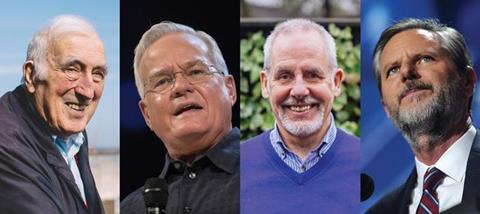As toxic behaviour by some of the Church’s biggest names is uncovered, Heather Tomlinson says the problem isn’t just with them. It’s with us

We all want the Church to be a light on a hill, salt in the earth, yet it seems every corner of the body of Christ has been hit by awful scandals. Many Christians feel despair and disappointment when our living heroes are revealed to be all too human, or even diabolical.
The sting was particularly painful in February when it was reported that Jean Vanier, the Catholic founder of the loving communities of L’Arche, a man widely adored and often described as a “living saint”, had a series of “manipulative and emotionally abusive” sexual relationships with women. There was an outpouring of grief on social media at this news. How could such an apparently holy man, who had seemed to care so much for the dignity of people with learning difficulties, have behaved like this? Surely his soul couldn’t have housed such selfish lust alongside such compassion and care?
Similar stories have come from all wings of the church: charismatic, conservative and liberal. Last year the Oxfordshire vicar Rev Timothy Davis was found guilty of spiritually abusing a teenage boy, while Bill Hybels resigned from his megachurch Willow Creek after former colleagues alleged he’d been guilty of sexual misconduct (Hybels denies this). Controversy has also dogged the church planting network Acts 29 as their CEO Steve Timmis was accused of bullying behaviour earlier this year. Timmis, who was also the pastor of The Crowded House in Sheffield resigned all leadership positions and his publisher pulled his books from sale.
Many people find scandals like these damaging to their faith in the Church and even in God. Perhaps this is because people such as Vanier had spiritually encouraged and inspired so many, including a number of our Christian leaders. The Most Rev Justin Welby, Archbishop of Canterbury, shared his enthusiastic praise of Vanier after his death in 2019 and before his alleged wrongdoing was exposed: “Jean Vanier lived the gospel in such a beautiful way that few who met him could fail to be caught up in it.” This seemed to be a common response to a man who was widely quoted and rarely questioned
Worshiping idols
We should not be surprised when celebrity Christians fall from their pedestals. In fact, we should expect that Christians in the limelight will not be the best examples of godliness. They may be charming and winsome – often that’s how people become leaders and visionaries in the first place – but where did we get the idea that the most holy Christians are those who are well known? Not from Jesus, who said: “But many who are the greatest now will be least important then, and those who seem least important now will be the greatest then” (Matthew 19:30, NLT). We’re reminded in 1 Samuel 16:7: “The Lord doesn’t see things the way you see them. People judge by outward appearance, but the Lord looks at the heart” (NLT).
This ‘celebrity culture’ – the idolising of people we have never met – is clearly dysfunctional. When we look outside the Church, which is where I believe we’ve imported it from, celebrities are treated like gods in our society. They’re regularly asked their opinions on politics and world events, and these thoughts are eagerly retweeted and spread on social media by thousands or millions of people. This is pretty strange when you think about it. Why would an actor’s skill of pretending to be someone else give them the wisdom required to tackle complex political problems? Should those people who are beautiful, or who make designer clothes, or who produce a stunning Instagram post, have more influence on our society than anyone else?
Out there in ‘the world’ it’s often accepted that celebrities will display more difficult behaviour than the average person. There are stories of tantrums, outrageous demands, wild orgies and prima donna behaviour. Then there are the unhappy falls from grace when drugs or mental health problems become overwhelming and a person’s life slides out of control. Sadly, this reality is often one of the reasons people end up in the public eye in the first place. Many people’s fame is enhanced when they do something unpleasant: Katie Hopkins became well known after being on reality TV show The Apprentice in 2007 after which she was caught in flagrante with a married man. Kim Kardashian was relatively unknown until the leaking of a sex tape she had made with ex-boyfriend Ray J. Stories of the intoxicated antics of people such as Oliver Reed, Lindsay Lohan and Britney Spears enhance their notoriety and ensure many column inches are devoted to them
Halos and the Holy Spirit
I see little spiritual value in celebrity culture. It seems that the urge to put people in the public eye or on a billboard doesn’t come from a good place, much of the time. The carousing of celebrities tells us something else: that being famous is either not good for the soul, or it attracts people who are already troubled. After all, wanting the praise and affirmation of the general public – people who don’t really know you – is not likely to be a sign of a secure and content individual.
It’s no surprise to me that ‘famous’ Christians often don’t do so well either. Speaking as a journalist who has met and interviewed many of them, I think it’s fair to say that they wear no more halos than your average Christian in the pew. They may have leadership talents, drive or speaking ability, but these do not generate good character, nor provide evidence of the Holy Spirit. Christians who are well-known for their great social justice work and apparent kindness and compassion have been extremely rude to me and other journalists I’ve worked with, or have tried to bully and pressure to get what they want. Others can be precious and difficult about what is written about them; some are desperate for publicity and fame.
It’s not just journalists. I’ve heard disappointment from others whose work brings them into contact with ‘celeb’ Christians. It can be discouraging if you discover that those who write books and appear to have done great things for Jesus are no more holy, kind or loving than anyone else. I believe such expectations are often disappointed.
Of course there are exceptions. I’ve met famous Christians who are lovely, but then Vanier was said to be a wonderful man by those who met him. The truth is that we can’t really know anyone unless we have shared life with them and, even then, only God truly knows a person’s heart and what they do when no one is looking. It doesn’t mean we shouldn’t love and respect such people. It does mean we shouldn’t put them on pedestals.
Pastors and pretensions
Some of the kindest and most loving people I’ve known in churches have been quiet and unassuming. They get on with serving Jesus in their own way. In our social media era, there’s a strong temptation to announce every good deed to the world via Facebook or Twitter, or even in our pulpits. Yet not seeking the praise or attention of others is admirable, biblical (see Matthew 6) and, I think it should be more sought after.
I vividly recall interviewing Jackie Pullinger for this magazine. She is understandably considered a Christian heroine due to an amazing ministry to Hong Kong’s drug addicts. She also wrote the bestselling book Chasing the Dragon (Hodder & Stoughton). I observed that Pullinger’s behaviour at a Christian conference was very different from many Christian ‘celebs’ I’d come across. She did no hob-nobbing with the pastors and Christian leaders, preferring to stay with the recovering addicts she’d brought with her. She was trying her best to avoid being interviewed and photographed by me. When I finally cornered her and dragged her in front of my dictaphone, she was reluctant, and only warmed up when I raised the issue of her celebrity status, which she described as “very” difficult.
“It’s anti the gospel,” she said. “God said: ‘I will pour my Spirit out on all flesh.’ So, the more you put one person on a pedestal, the more people think there’s a special anointing or something, which is not true, and it actually makes the Church go backwards and not forwards. We’re not going to reach the ends of the earth if we’re relying on a few specially anointed or gifted people. The good news is that the job was given to every ordinary, weak kind of person.”
She warned about the lure of being on a stage at such events, and its effects. Perhaps this is one subject that celebrities can justifiably speak about with authority – the danger of fame. It’s something they have good experience of, and I think it’s wise to listen to them (see page 55).
Merits of meekness
A refreshingly honest confession was made recently by Eddie Arthur, who used to run Wycliffe Bible Translators. On his blog, he described the difficulty of leaving this role and his feelings about the subsequent loss of rank and invitations to speak. People who’d called him a “really good friend” have not contacted him since. Though he was aware he “shouldn’t” find it hard, in reality: “The loss of status was horrible.”
“Leadership is insidious and it is dangerous. I didn’t realise how important my role, influence and title were to me until I stepped down...At this distance, I can see that it would have been all too easy to see myself as being more important than I am and to believe that normal rules didn’t apply to me. I can understand why leaders fall and I can see why those responsible for monitoring them allow it to happen.”
The more that we put people on pedestals, the less we’re helping them to grow in their relationship with God. We shouldn’t be surprised that those we idolise disappoint us – the very word ‘idol’ gives us a clue. If we change church culture so that we discourage people from seeking the spotlight, and we avoid creating heroes and heroines, we’ll be less disappointed and we’ll do our leaders a favour. The only people we’ve got a hope of knowing the character of are those we spend time with daily – those in our own church communities and neighbourhoods. We can look to them for inspiration and encouragement if we need to. Even then, history tells us that we could be disheartened if we pin our hopes on anyone but Jesus himself.
It’s good to see Jesus in, and to be inspired by, the ordinary Christian, the gentle and the quiet; those who love and serve God and their neighbour without telling anyone about it. In our current age, meekness goes against the grain, but true humility and Christ-likeness will not disillusion us.







































No comments yet